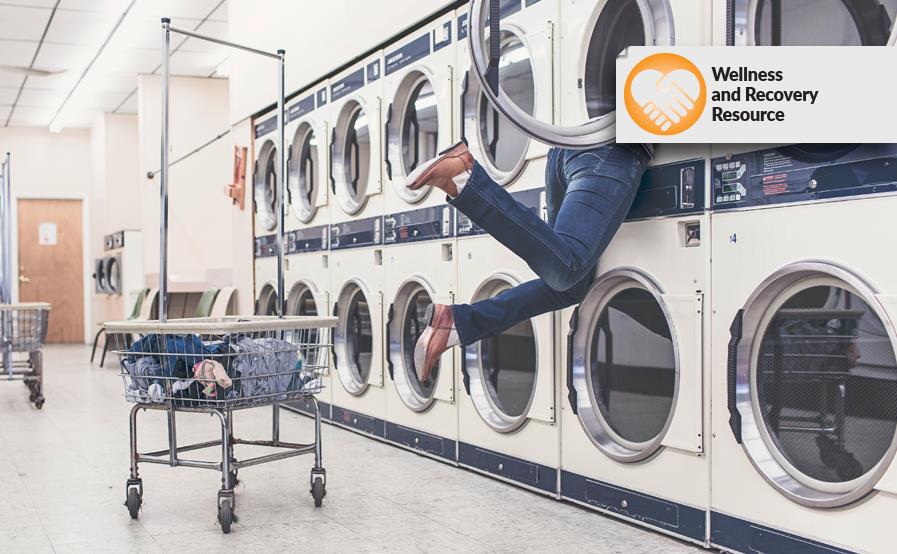Every Wednesday, two friends – musician and storyteller Clare Bowditch and author and editor Jamila Rizvi – fold their washing as they catch up in the company of their 9,000-strong Facebook group, Quarantine with Jam and Clare.
It’s a shared, ordinary moment in difficult and uncertain times.
‘I think what’s comforting about it,’ explained Rizvi, ‘is that no matter what is happening in our world, there’s always washing to fold, there’s always household chores. We know this from more individual times of crisis – when someone in the family becomes really ill, or you’re mourning a loss, those ordinary markers of daily domestic life continue.’
Such simple acts bring welcome monotony among the often overwhelming emotions generated during the pandemic, but also a sense of occasion by bringing people together and rendering a ‘dull private moment’ into something that is shared, Rizvi said.
‘It gives people a sense of routine but also occasion, and I think it can make us feel a bit safe to have that as a kind of scaffolding to our days and to our weeks when it feels like otherwise, they’re all blurring together.’
A bedrock for mixed feelings
It’s been fascinating to observe the collective response of creatives and how they’re coping in the pandemic. Sharing more than 60 written and audio responses in a special podcast episode of Routines & Ruts revealed that ultimately, there is no one way to feel, even at one time.
We are confused, we are elated, we are sad, we are distracted, we are fighting, we are unsure, we are unproductive, we are motivated, we are uncertain, we are hopeful. We feel tired, guilty, bored, less focussed, like there isn’t anything to look forward to. There is a sense of hopelessness, of shock, of fear and collective grief, but also some moments of joy and appreciation.
Days feel both fast and slow. People are missing people, but also relishing not having plans. People are at times turning to routines for comfort, but turning away from the pressure of productivity or creative output.
There might be not be one way to navigate these shifting feelings, but as the weekly laundry-folding meet-up reveals, it’s important to create spaces for them.
The first thing Rizvi and Bowditch do when they meet online is check in and see how the other is going.
‘It sounds really simple, but sometimes the answer is happy or silly, or sometimes it’s a really hard response but by sharing the up and down we give people a space to feel however they’re feeling and to acknowledge that that’s fine.,’ Rizvi said.
Read: Where artists can go for help in isolation
As she describes it, we’re experiencing waves of grief for how life used to be. This can at times have us holding onto two seemingly contradictory emotions at the same time – collective despair at the state of the arts sector, and hope for something else happening in our personal lives.
Another example of this ‘and both’ feeling is how we can feel together apart. Quarantine with Jam and Clare formed when Bowditch and Rizvi were no longer able to host their popular in-person events, Tea with Jam and Clare. As the Facebook group grew, a sense of community has developed, with people looking out for one another and providing advice, but also a real sense of companionship.
The ordinary is worth paying attention to
The friends and the thousands who join them each week to fold their laundry aren’t the only people who are finding comfort and joy in small routines amid the pandemic’s external and internal pressures.
From the selection of written and audio responses observed from creatives in Routines & Ruts, collectively there seems to be a greater capacity or appreciation for noticing the small things that might have previously been overlooked in our day lives.
Ordinary things like rediscovering the joy of sending mail and looking forward to receiving those letters that aren’t just bills and brochures regularly featured. Some people are enjoying reading more, others are listening to audiobooks, experimenting with cooking, and feel more self-reliant than they had ever imagined.
These small habits and approaches can bring delight and even joy to our days in times of chaos. As one respondent put it, ‘Life has become simpler and more focused in some ways, and much more uncertain in others. I’ve realised how much delight I take in the small things. A hot coffee, a conversation, touch, time to write and draw, a good book or movie, cooking, the sunshine.’
The small things might also make the concept of gratefulness more tangible, as another respondent said. ‘It’s easy to be grateful when things are going well. It’s definitely more difficult during this time of stress, unknowing, and even danger. Finding the lid to a Tupperware container on the first try was something to be grateful for.’
‘I’ve realised how much delight I take in the small things. A hot coffee, a conversation, touch, time to write and draw, a good book or movie, cooking, the sunshine.’
Some people have taken up identifying backyard insects, watching birds, or observing the neighbour’s cat pounce on flies and trying to catch flying leaves.
Another creative said they take comfort in seeing life still moving around them. ‘As I’m writing this, my neighbour across the road is mowing his lawn. It is the small daily life activities, trivial or not, that bring comfort and help us cope by restoring our sense of normality.’
The act of noticing is not tied to a goal, output or outcome, but as many creative people shared they feel uninspired and unmotivated during this time, it can provide a sense of refuelling.
Illustrator Juliet Sulejmani is working on a book and has found an interesting way to substitute her need to explore by visiting new cities in street view. ‘I love to explore and I love going outside, interacting with people, and seeing things, and touching things, and obviously I can’t do that at the moment, so that’s been a bit of a struggle – I’ve been spending a lot of time on Google Maps and I’ve been spending a lot of time in Japan, so I get the little yellow Google guy and I drop him into different streets and I’ve been exploring a lot of places that way, and I started drawing a lot of architecture.’
Artist, producer, art therapist, and founder of Dead Letter Club, Melanie Knight, has found it difficult to translate the connecting and the powerful work that she does to the digital space, so for now is observing and re-imagining, and looking for the little things as a way to prepare herself for when things pick up pace again.
‘If I can just write one sentence or draw one squiggle or do one star jump or pick up one leaf and stare at it and consider it for a couple minutes, or stop on my walk and don’t take another step until I hear a bird call, then I know that I’ve moved through the day and will be ready, or as ready as I can be,’ she said.
Movement was also a common way for people to find delight in the everyday. Dancer and choreographer Amrita Hepi shared a delightful way to both move and appreciate the small things. ‘Try kite flying as a performative act. It’s a nice way to have distanced conversations or to feel like you’re having an activity in the public realm. It doesn’t replace having a cocktail, but it’s still quite nice,’ she said.
Comic artist, author, and graphic recorder Sarah Firth has been taking what she coined ‘state of emergency walks’ where she leaves the house with a notebook for an hour and allows herself to just walk, look, think and draw.
‘Because we’re currently in a state of emergency, which is stressful and challenging, I wanted to create an opportunity to get back into a mindful, present, emergent state. Paying attention to what’s coming up inside of me, what I run into, what I notice. It’s really playful and fun and I have no idea what’s going to happen ahead of time, so there’s something invigorating and delightful and joyous about it, and those emergency walks have been really important, actually.’
As a parent, Rizvi has also found that structures which were previously frustrating are now comforting, ‘Bedtime, bath, books provides some real certainty and structure in a way that the previously could be a bit frustrating and now is really welcome.’
Ordinary moments protect against creativity-anxiety
Finding it a challenge to create, prioritise, or find focus for creative work was a common thread from the survey of creatives.
Some feel the pressure to ‘make the most of this opportunity’ or ‘write your great novel now’ or ‘pivot to online and keep growing’, but also find it to be a very unhelpful expectation in an already stressful situation.
As one respondent said, ‘Creativity that expects anything in return is never positive. It has to be free of any burdens for it to be fun and meaningful to me.’
Aside from expectations, there is also the reality that not everyone has more time to be creative or to ‘seize the moment’. As one respondent said, ‘I have less time. I’m a writer by day, for a public organisation, and a creative fiction writer and scriptwriter in the corners and pockets of time that I create around it. Those corners have vanished. Not being able to go to work and have the kids go to childcare and school means I don’t have a break. There’s a constant hum of anxiety and things to do, and no time for my own luxuriant thoughts and creative processes. We just have to get through it.’
Instead of pressuring themselves to be creative, some are finding that focus on their basic necessities and creativity comes in the form of activities like cooking. This focus on basic needs, of navigating a complete shift in circumstances was a common thread, and perhaps speaks to a larger rethinking of priorities or focus not just for creatives, but everyone.
While this crisis will pass, it will be different, and each of us will take different things with us from this experience.
As artist Peter Drew puts it: ‘It’s a weird thing, that a crisis like this does focus your anxieties. It organises them. It puts it all in one box, and it gives everyone a shared sense of responsibility. I feel united with everyone in a way because we’re all going through this thing,’ he said.
In this way, perhaps opening up our capacity to notice the ordinary, to fold our laundry as we ask a good friend how they’re doing, opens up our capacity to notice even more.
As Drew explained, ‘There’s always been people who are suffering, but now there’s this feeling of everyone’s attention is on the people who are suffering, and there’s something good about that in that it feels like we’re all together in some way. I do like that and I hope we don’t lose that as soon as this thing is over. I hope this makes us better in the long run.’
The Wellness and Recovery Resource is supported by the Judith Neilson Institute for Journalism and Ideas.






